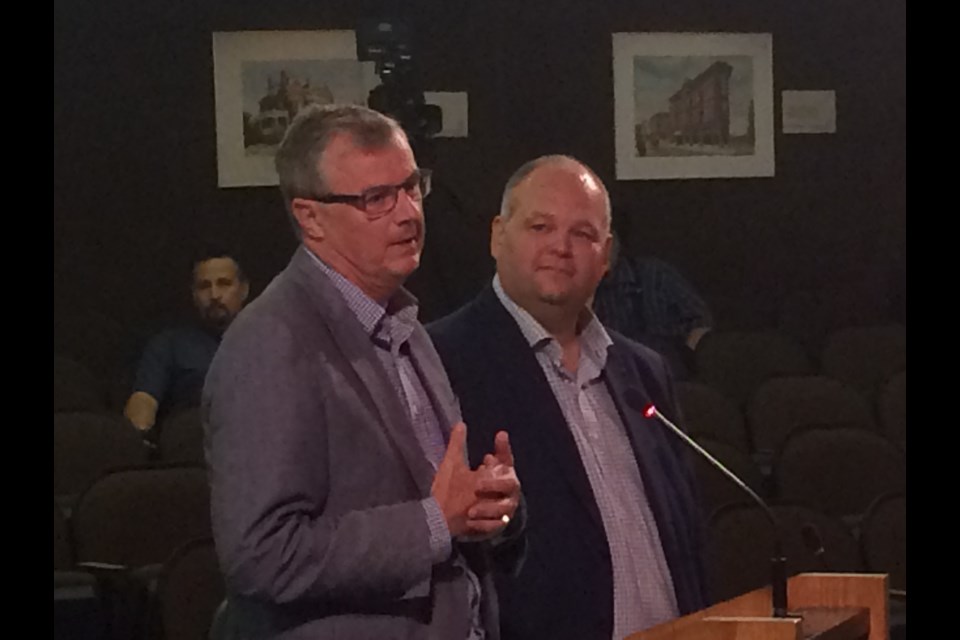Tourism in on the decline in North Bay.
Director of Tourism North Bay, Steve Dreany says the city saw a significant drop from January 1st to May 31st, 2018 over the previous year.
“Tourism dropped 4.7% in that period of time, including the boost we got from the World Women’s Curling Championship. So all of those people who came into the community, what they did was prevent that 4.7% from being an even larger number. North Bay was one of only three communities in the province to experience a decline.”
Dreany along Tourism North Bay advisor Jake Lacourse made a presentation to council requesting it approve the implementation of a municipal accommodation tax, in essence a user fee, for visitors staying overnight in local hotels and motels.
“It’s a 4% accommodation tax. Average rates in the city are anywhere between $104 and $119 depending on what hotel you’re at, so you’re looking at about roughly $4 or $5 added to their bill per night. Because it’s a municipal tax, it allows a level playing field for all accommodation partners to have to collect it. So no longer is there going to be the ability for you to say you’re not going to pay the 4% at one hotel and check in at one that doesn’t have it. It’s a tax no different from GST or HST, ” said Lacourse.
“We’ve had the ability to put something like this forward since November 1st 2017 when the municipal act was amended to be able to put this through. Ottawa was the first out of the gate, bigger cities started to follow suit. Now cities in the north are starting to implement it as we’ve seen with Sudbury. It started the implementation phase as of September 1st,” said Lacourse.
“What this means is we’ve been behind the eight ball to the tune of roughly $80,000 to $85,000 a month in missed revenue opportunities. We figure it’s about $850,000 annually. There’s roughly 500 rooms in the community with the small mom and pop operations, add those to the other 1,010 rooms that we have with the branded operations, there’s some real potential to hit one million dollars in the first year, and it can only benchmark from there and go up.”
Dreany says not proceeding with the tax would be a lost opportunity.
“We have not had a dedicated tourism person coordinating the marketing for the community for a number of years. It’s been a long slow erosion,” said Dreany.
“Product development is one of the things we talk about. It’s taking the things that we have in the community, putting it together in a package so we can market it to people outside the community to come here. For instance, all we have to do is create a three or four-hour adventure or something for people to do, for them to stay overnight. That can be hiking on trails, mountain biking, cruises on the Chief Commanda, but we have to put those together in a package with the hotels to be able to market it. Also, we’ll be going out to shows like the Ontario Motor Coach Association. North Bay hasn’t attended that in probably 15 years. The meetings and incentive travels, the corporate travellers, creating opportunities for them so when the CEO of a company says we want to do a team building experience, we have a package for them. They come in for business, but they’ll probably come back as leisure travellers with their family.”
Lacourse says meetings and conventions are an important part of the puzzle.
“There’s tons of opportunity out there, we just didn’t have any dollars up to this point. We had the opportunity to host the Ontario Motor Coach Association, which is bus tour operators. They have an annual AGM, but we didn’t have the $12,000 bid fund that we had to put forward to show that we could guarantee they wouldn’t lose money up to $12,000. If they made a profit, we didn’t pay anything. We couldn’t get that money together to be able to host it. We had to turn away a 400 person conference for three days.”
With the money collected through the municipal accommodation tax, the group isn’t expecting to have to pass on very many bids in the future.
“Tourism is tourism according to us. So if there’s a sports tourism event, if it’s an arts and culture event, or a festival, it’s a tourism event. Not only would we be concentrating on getting heads in beds, but we’re also going to be driving people into the events. Right now we have a really good product, but we’re not able to tell anybody about it,” said Lacourse.
Council will be presented with a report after the first full year of implementation. Money collected will be a 60/40 split with the city.
“We’re going to be showing what we collected, here’s the split, here’s how we paid for stuff, and from that split what we’ve done with that money. This is to show in real time, that with real dollars, and with a real marketing effort, we can really attract some positive tourism efforts to the community with a positive economic impact to the community,” said Lacourse.
Dreany says there is no cost to residents anywhere along the way.
“Even the cost of collecting it and administering it comes from people outside of the community. The other thing we want people to understand is other communities are doing it as well. All we’re doing is leveling the playing field and we are generating the revenue from outside the community, to market our community to help our community to grow.”
Sudbury has opted for a similar hotel tax this September.
See related: Sudbury Hotel Tax starts Sept. 1
